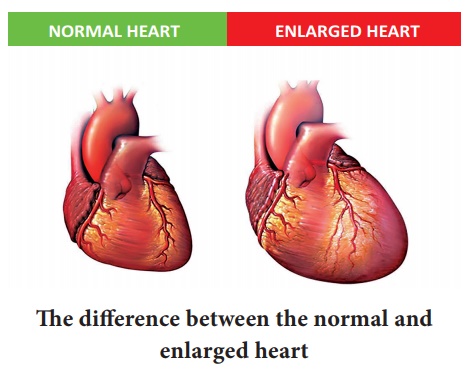Definition, Types, Causes, Signs, Symptoms, Diagnosis, Management, Prevention - Congestive Cardiac failure | 12th Nursing : Chapter 2 : Medical Surgical and Applied Nursing Management Psychology of Human Diseases
Chapter: 12th Nursing : Chapter 2 : Medical Surgical and Applied Nursing Management Psychology of Human Diseases
Congestive Cardiac failure
Congestive Cardiac failure
Heart failure, sometimes known as congestive heart failure, occurs
when the heart muscle doesn't pump blood. In certain conditions, such as
narrowed arteries in the heart (coronary artery disease) or high blood
pressure, gradually the heart become too weak and failed to pump efficiently.
Definition
Congestive Cardiac Failure (CCF) Cardiac failure often
referred to as congestive heart failure is the inability of the heart to pump
sufficient blood to meet the need of the tissues for oxygen and nutrients.
The term congestive heart failure is most commonly used when
reopening to left sided and right sided failure.
Common types
Left-sided CHF is the most common type of CHF. It occurs
when the left ventricle doesn’t properly pump blood out to the body.
There are two kinds of left-sided heart failure:
Left-sided heart failure
·
Systolic heart failure occurs when the left ventricle fails to
contract normally.
·
Diastolic failure, or diastolic dysfunction, happens when
the muscle in the left ventricle becomes stiff.
Right-sided CHF occurs when the right ventricle has
difficulty pumping blood to the lungs. Blood backs up in the blood vessels,
which causes fluid retention in the lower extremities, abdomen, and other vital
organs.
Causes
·
Cardiac muscle disorder
·
Coronary atherosclerosis
·
Systemic or pulmonary hypertension
·
Systemic factors
·
Degenerative diseases of the myocardium
·
Stenosis of a semilunar valve.
·
Hemorrhage
·
Anemia
Risk factors
·
Hypertension and diabetes
·
Alcohol and smoking
·
Use of cardio toxic
·
Cocaine abuse drugs
Signs and Symptoms
·
Pulmonary edema
·
Dyspnea
·
Cough
·
Shortness of breath
·
Congested lungs
·
Sodium and Fluid retention
·
Low perfusion
·
Dizziness
·
Fatigue and weakness
·
Rapid or irregular heart beats
·
Oliguria
·
Nacturia

Diagnosis
·
Echocardiography.
·
ECG
·
X-ray chest
·
Blood test
·
Cardiac catheterization
·
Arterial Blood Gas analysis (ABG)
Management
·
Pharmacologic therapies include the use of diuretics, vasodilators,
inotropic agents, anticoagulants, beta-blockers.
·
Invasive therapies for heart failure include electro physiologic
intervention
·
Cardiac resynchronization therapy (CRT)
·
Pacemakers
·
Implantable cardioverter-defibrillators (ICDs); revascularization
procedures
Nursing management
·
Provide comfortable bed
·
Oxygen administration
·
Start Intra Venous (IV) line
·
Vital signs
Diet therapy
·
Restricted sodium
·
Restricted fluids
Complications
·
Intractable heart failure
·
Cardiac arrhythmias
·
Myocardial failure
·
Cardiac arrest
·
Pulmonary infraction
·
Pneumonia
Prevention
Lifestyle changes can help to prevent heart failure include:
·
No smoking
·
Controlling certain conditions, such as high blood pressure and
diabetes
·
Staying physically active
·
Eating healthy foods
·
Maintaining a healthy weight
·
Reducing and managing stress
Related Topics